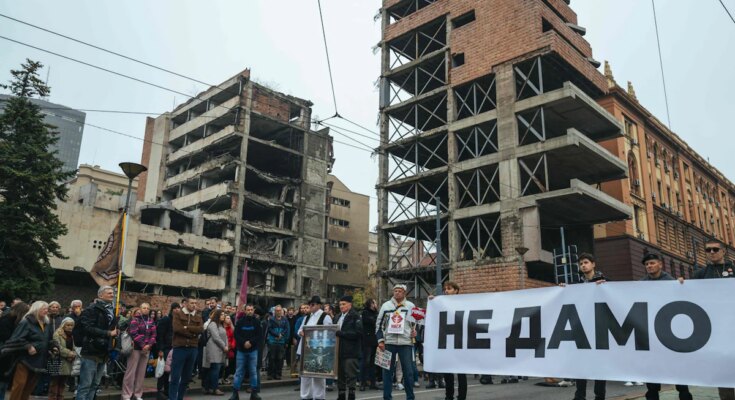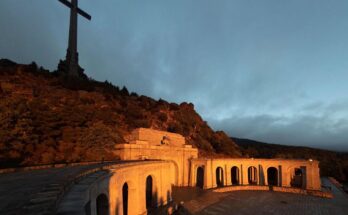On Tuesday afternoon they observed 17 minutes of silence. Thousands of people gathered around the General Staff building in the center of the Serbian capital, Belgrade; they would defend this monument with their “bodies,” they explained. They have painted red lines on the floor and positioned themselves along them as “living walls.”
17 minutes of silence. One was for the victims of the NATO bombing in 1999 – and 16 minutes in memory of the people who died a year ago when a train station canopy collapsed in the northern city of Novi Sad. Therefore, the message conveyed is very clear: This protest is not just about history and the protection of monuments, but about something very fundamental in the relationship between citizens and the state.
Many residents consider the demolition of the memorial to be a mockery of history
Parliament gave the reason for the demonstration this Tuesday. On Friday, with the Serbian Progressive Party (SNS) majority in power, they passed the so-called Lex Specialis: a law that makes it possible to demolish the general staff building and build a luxury hotel on its site. There are already concrete plans to do this, namely from US President Donald Trump’s closest circle. His son-in-law Jared Kushner and his investment company “Affinity Partners” want to build not only a hotel but also 1,500 apartments and – one must be historically aware – a museum at the historic location. However, from the perspective of many people in Serbia, the plan is a mockery of their history.
The General Staff Building is a historical monument in two respects. Designed in the 1950s by architect and urban planner Nikola Dobrović, the building is considered “an important work of Serbian and Yugoslav post-war architecture” and was thus given official status as a cultural monument. On the other hand, it – unofficially – became a memorial for many people in Serbia when the city was bombed twice in NATO airstrikes in April and May 1999.
At that time, the Western defense alliance decided to go on the offensive, without a mandate from the UN Security Council, to stop the Milosevic regime from rampaging against the Albanian population of Kosovo. To this day, the ruins remain a gaping wound in Belgrade’s cityscape, and, as opposition politicians wish, they must continue to do so.
The state is pursuing the plan with great urgency
For Marinika Tepić, a member of parliament from the Peace and Justice Party (SSP), the partially destroyed army buildings are “a symbol of resistance” and “proof that destroyed countries and failed states can be resurrected.” The government is now sacrificing its own country’s history “just to please Donald Trump.”
President Aleksandar Vučić, in turn, accused the opposition of opposing “better relations with the Trump administration.” The Lex Specialis passed on Friday elevated Trump’s son-in-law’s investment to a project of “eminent importance for the Republic of Serbia.” Therefore, responsible authorities are required to provide high “priority” and “urgency”.
Special statutory instruments are nothing new in the repertoire of the ruling SNS party, which is controlled by Vučić. Ten years ago, Lex Specialis paved the way for the development of the luxury Belgrade Waterfront district on the banks of the Sava River, which had previously been taken over by private landowners and, according to critics, compensated well below market value.
From the perspective of many people in Serbia, the new law is further evidence of how cruelly the government treats its citizens. The country has remained embroiled in protests for more than a year: After it became clear that the collapse of a train station canopy in Novi Sad in early November 2024 appeared to be caused by official misconduct and corruption, these mournful demonstrations developed into a broad protest movement against the rule of law and democracy. The government has sometimes sent its security forces violently against demonstrators. President Vučić accused “foreign powers” of fomenting the protests and called critical journalists “terrorists.”
The gathering around the General Staff Building on Tuesday was just one of many recent protest events. Last Thursday, for example, students in various cities carried out study strikes as a form of solidarity with Dijana Hrka who went on hunger strike on the first anniversary of the Novi Sad train station disaster. His son Stefan was one of 16 people killed by the collapse. They and their supporters demanded that those responsible “be held accountable.” And President Vučić called for new elections.



